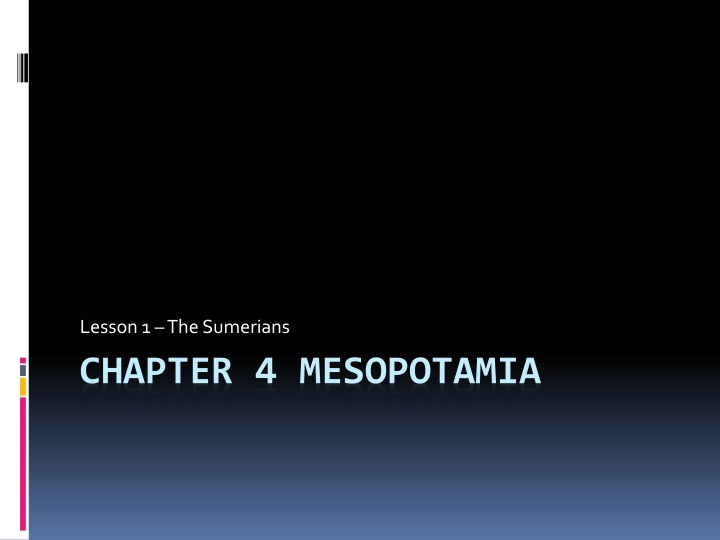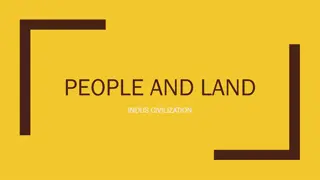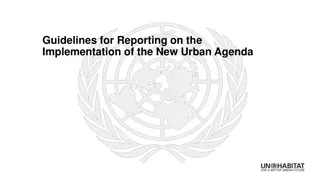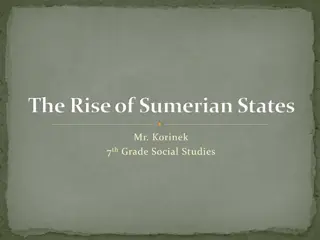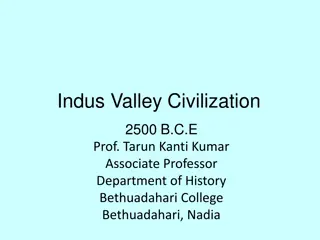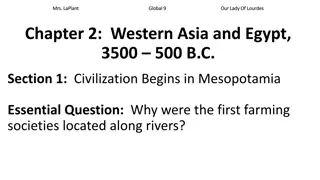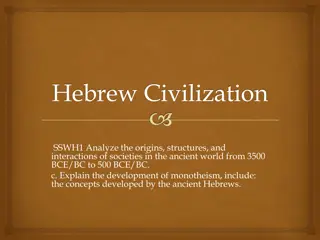Civilization of Sumer: Mesopotamia's First Urban Society
Mesopotamia, the cradle of civilization, saw the rise of the Sumerians in 3000 BC. Situated between the Tigris and Euphrates rivers, the Sumerians developed advanced city-states, introducing writing, agriculture, and social classes. Their legacy includes innovations in irrigation, city planning, and culture, shaping the foundation of early civilization.
Download Presentation

Please find below an Image/Link to download the presentation.
The content on the website is provided AS IS for your information and personal use only. It may not be sold, licensed, or shared on other websites without obtaining consent from the author.If you encounter any issues during the download, it is possible that the publisher has removed the file from their server.
You are allowed to download the files provided on this website for personal or commercial use, subject to the condition that they are used lawfully. All files are the property of their respective owners.
The content on the website is provided AS IS for your information and personal use only. It may not be sold, licensed, or shared on other websites without obtaining consent from the author.
E N D
Presentation Transcript
Lesson 1 The Sumerians CHAPTER 4 MESOPOTAMIA
The First Civilizations 3000 BC first civilizations develop River Valley Civilizations Mesopotamia Tigris and Euphrates Rivers Egypt Nile River India Indus River China Yellow River
Mesopotamia The land between two rivers Tigris and Euphrates Modern day Iraq Fertile Crescent This area had fertile farmland extending from Israel to Iraq First civilizations developed here
Why civilizations near rivers? Floods causes fertile soil good for farming Surplus extra products that were used to trade for good they did not have Writing developed because of the need to keep records of trade Trade helped spread new ideas and customs
Sumer First Civilization Location Southern Mesopotamia Settled 3000 BC They used: Levees raised earth to control floods Irrigation artificial watering system Crops: Barely, wheat, sesame, flax, fruit trees, dates, and vegetables
City States Used sun-dried mud bricks to build Greatest Cities Ur, Uruk, and Eridu City-States had their own government, religion, and farmland Social Classes Upper class Kings, priests, warriors, government officials Middle class merchants, farmers, fishers, artisans Lower class slaves
In the City-States Wars were fought between them Ziggurat Temples at the center of the city surrounded by markets Religion Polytheism belief in more than one God Usually based on forces of nature
Edubbas schools only for the rich Main subject writing Cuneiform Sumerian writing Scribe- writer, record keeper Women could own property Husband is the head of the family Could sell the wife or children
Priest-Kings Sumerian priests who were also kings of the city- state Gilgamesh priest-king of Uruk Gilgamesh Epic p.84-85 Assembly Group of freemen who gave advice to priest-kings and pick a military leader to rule during times of war Hereditary kingship passed on from father to son
Contributions of Sumer Earliest civilization Written records and laws Wheel, plow, and sailboat 12 month calendar based on the moon Number system based on 60
